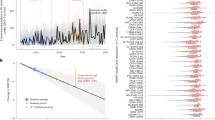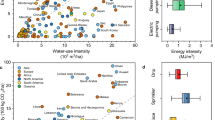Abstract
To overcome the current impasse in global climate negotiations we propose a compromise for sharing the remaining carbon budget, based on four elements. First, limiting initial action to the Major Economies Forum members would streamline negotiations greatly. Second, using consumption-based carbon accounting would overcome important fairness concerns of key developing countries. Similarly, applying equity principles of responsibility and capability to apportion the burden of emissions reductions within the group can address concerns of both the global north and south. And fourth, promptly bringing this compromise back to the United Nations negotiations for wider adoption will be critical. Based on an indicative carbon budget of 420 gigatonnes carbon dioxide over the period 2012–2050, our analysis shows that ambitious but feasible emissions reductions will be needed, with sharp differences by world economic groups. The compromise offers effectiveness, feasibility and fairness.
This is a preview of subscription content, access via your institution
Access options
Subscribe to this journal
Receive 12 print issues and online access
$209.00 per year
only $17.42 per issue
Buy this article
- Purchase on Springer Link
- Instant access to full article PDF
Prices may be subject to local taxes which are calculated during checkout

Similar content being viewed by others
Change history
02 October 2014
In the version of this Perspective originally published, reference 20 contained a typographical error and should have read: Purdon, M. Neoclassical realism and international climate change politics: moral imperative and political constraint in international climate finance. J. Int. Relat. Dev. 17, 301–338 (2014). This error has now been corrected in the HTML and PDF versions of the Perspective.
References
Keohane, R. O. & Victor D. G. The regime complex for climate change. Perspect. Polit. 9, 7–23 (2011).
Bodansky, D. The Copenhagen climate change conference: A postmortem. Am. J. Int. Law 104, 230–240 (2010).
Falkner, R., Hannes, S. & Vogler, J. International climate policy after Copenhagen: Towards a building blocks approach. Glob. Policy 1, 1–11 (2010).
Parks, B. C. & Roberts J. T. Climate change, social theory and justice. Theor. Cult. Soc. 27, 134–166 (2010).
Hurrell, A. & Sengupta, S. Emerging powers, North–South relations and global climate politics. Int. Aff. 88, 463–484 (2012).
Like-Minded Developing Countries on Climate Change. Submission to the Ad-Hoc Working Group on the Durban Platform for Enhanced Action (ADP) on the Implementation of all the elements of decision 1/CP.17, (a) Matters related to paragraphs 2 to 6. (UNFCCC, 2013).
Harris, P. G. & Symons, J. Norm conflict in climate governance: greenhouse gas accounting and the problem of consumption. Global Environ. Polit. 13, 9–29 (2013).
Barrett, S. Environment and Statecraft: The Strategy of Environmental Treaty-Making (Oxford Univ. Press, 2005).
Terhalle, M. & Depledge, G. Great-power politics, order transition, and climate governance: insights from international relations theory. Clim. Policy 13, 572–588 (2013).
Underdal, A. in International Multilateral Negotiation: Approaches to the Management of Complexity (ed. Zartman, I. W.) 178–197 (Jossey-Bass, 1994).
Young, O. Political leadership and regime formation: On the development of institutions in international society. Int. Organ. 45, 281–308 (1991).
Andresen, S. & Agrawala, S. Leaders, pushers and laggards in the making of the climate regime. Global Environ. Chang. 12, 41–51 (2002).
Grundig, F. & Ward, H. Structural group leadership and regime effectiveness. Polit. Stud. http://doi.org/sz4 (2013).
Price, R. Moral limit and possibility in world politics. Int. Organ. 62, 191–220 (2008).
Sen, A. K. The Idea of Justice (Belknap/Harvard, 2009).
Stocker, T. F. The closing door of climate targets. Science 339, 280–282 (2013).
Allen, M. R. et al. Warming caused by cumulative carbon emissions towards the trillionth tonne. Nature 458, 1163–1166 (2009).
Stern, N. (ed.) The Economics of Climate Change [The Stern Review] (Cambridge Univ. Press, 2007).
Nordhaus, W. A Question of Balance: Weighing the Options on Global Warming Policy (Yale Univ. Press, 2008).
Purdon, M. Neoclassical realism and international climate change politics: moral imperative and political constraint in international climate finance. J. Int. Relat. Dev. 17, 301–338 (2014).
Rose, G. Neoclassical realism and theories of foreign policy. World Polit. 51, 144–172 (1998).
Grundig, F. Patterns of international cooperation and the explanatory power of relative gains: An analysis of cooperation on global climate change, ozone depletion, and international trade. Int. Stud. Q. 50, 781–801 (2006).
Vezirgiannidou, S. E. The Kyoto agreement and the pursuit of relative gains. Environ. Polit. 17, 40–57 (2008).
Brenton, A. 'Great Powers' in climate politics. Clim. Policy 13, 541–546 (2013).
Bäckstrand, K. & Elgström, O. The EU's role in climate change negotiations: from leader to 'leadiator'. J. Eur. Public Policy 20, 1369–1386 (2013).
Eckersley, R. Moving forward in the climate negotiations: Multilateralism or minilateralism? Global Environ. Polit. 12, 24–42 (2012).
Nelsen, A. US considers shifting climate negotiations away from UN track. The Guardian, Guardian Environment Network, 16 November 2012; http://www.theguardian.com/environment/2012/nov/16/us-considers-climate-negotiations-un
Victor D. G. A Madisonian approach to climate policy. Science 309, 1820–1821 (2005).
Stiglitz, J. A new agenda for global warming. Econ. Voice 3, Article 3 (2006).
Barrett, S. Rethinking climate change governance and its relationship to the world trading system. World Econ. 34, 1862–1882 (2011).
Leal-Arcas, R. Climate change mitigation from the bottom up: using preferential trade agreements to promote climate change mitigation, Carbon Clim. Law Rev. 7, 34–42 (2013).
Leal-Arcas, R. Working together: How to make trade contribute to climate action. Information Note, International Center for Trade and Sustainable Development, Geneva (2013).
Pan, J., Phillips, J. & Chen, Y. China's balance of emissions embodied in trade: approaches to measurement and allocating international responsibility. Oxf. Rev. Econ. Policy 24, 354–376 (2008).
Van Asselt, H. & Brewer, T. Addressing competitiveness and leakage concerns in climate policy: An analysis of border adjustment measures in the US and the EU. Energ. Policy 38, 42–51 (2010).
Steinberger, J. K., Roberts, J. T., Peters, G. P. & Baiocchi, G. Pathways of human development and carbon emissions embodied in trade. Nature Clim. Change 2, 81–85 (2012).
Eckersley, R. The politics of carbon leakage and the fairness of border measures. Ethics Int. Aff. 20, 367–393 (2010).
Kanemoto, K., Moran, D. Lenzen, M. & Geschke, A. International trade undermines national emission reduction targets: New evidence from air pollution. Global Environ. Change 24, 52–59 (2014).
Davis, S., Caldeira, K. Consumption-based accounting of CO2 emissions. Proc. Natl Acad. Sci. USA 107, 5687–5682 (2010).
Peters, G. P. Minx, J. C., Weber, C. L., Edenhofer, O. Growth in emission transfers via international trade from 1990 to 2008. Proc. Natl Acad. Sci. USA 108, 8903–8908 (2011).
Peters, G. P. & Hertwich, E. G. Post-Kyoto greenhouse gas inventories: production versus consumption. Clim. Change 86, 51–66 (2008).
Steininger, K. et al. Justice and cost effectiveness of consumption-based versus production-based approaches in the case of unilateral climate policies. Global Environ. Change 24, 75–87 (2014).
Bows, A. & Barret, J. Cumulative emission scenarios using a consumption-based approach: a glimmer of hope? Carbon Manag. 1, 161–175 (2010).
Peters, G. P. From production-based to consumption-based national emission inventories. Ecol. Econ. 65, 13–23 (2008).
Peters, G. P., Davis, S. J. & Andrew, R. A synthesis of carbon in international trade. Biogeosciences 9, 3247–3276 (2012).
Le Quéré, C. et al. The global carbon budget 1959–2011. Earth Syst. Sci. Data Discuss. 5, 1107–1157 (2012).
Shue, H. in International Politics of the Environment (eds Hurrell, A. & Kingsbury, B.) 373–397 (Oxford Univ. Press, 1992).
Brunnée, J. & Streck, C. The UNFCCC as a negotiation forum: towards common but more differentiated responsibilities. Clim. Policy 13, 589–607 (2013).
Grasso, M. Sharing the emission budget. Polit. Stud. 60, 668–686 (2012).
Winkler, H. & Rajamani, L. CBDR&RC in a regime applicable to all. Clim. Policy 14, 102–121 (2014).
Caney, S. Justice and the distribution of greenhouse gas emissions. J. Glob. Ethics 5, 125–146 (2009).
Jamieson, D. in Perspectives on Climate Change: Science, Economics, Politics, Ethics (eds Sinnott-Armstrong, W. & Howarth, R. B.) 217–248 (Elsevier, 2005).
Miller, D. Global justice and climate change: how should responsibilities be distributed? The Tanner Lectures on Human Values. The International Spectator, Part I and II, 28, 119–156 (2008).
Shue, H. Global environment and international inequality. Int. Aff. 75, 531–545 (1999).
Meyer, L. H. Why historical emissions should count. Chi. J. Int. Law 13, 597–685 (2013).
Neumayer, E. In defence of historical accountability for greenhouse gas emissions. Ecol. Econ. 33, 185–192 (2000).
den Elzen, M. G. J., Olivier, J. G. J., Höhne, N. & Janssens-Maenhout, G. Countries' contributions to climate change: effect of accounting for all greenhouse gases, recent trends, basic needs and technological progress. Clim. Change 121, 397–412 (2013).
Friman, M. & Strandberg, G. Historical responsibility for climate change: Science and the science-policy interface. WIREs Clim. Change 5, 297–316 (2014).
Page, E. A. Distributing the burden of climate change. Environ. Polit. 17(4), 556–575 (2008).
Baer, P. The greenhouse development rights framework for global burden sharing: reflection on principles and prospects. WIREs Clim. Change 4, 61–71 (2013).
Pauw, P. Bauer, S. Richerzhagen, C. Brandi, C Schmole, H. Different perspectives on differentiated responsibilities: A state-of-the-art review of the notion of common but differentiated responsibilities in international negotiations. DIE Discussion Paper 6/2014, Bonn (2014).
Bodansky, D. in The Oxford Handbook of International Environmental Law (eds Bodansky, D., Brunnée, J. & Hey, E.) 704–723 (Oxford Univ. Press, 2007).
Karlsson-Vinkhuyzen, S. I. & McGee, J. Legitimacy in an era of fragmentation: the case of global climate governance. Global Environ. Polit. 13, 56–78 (2013).
Meinshausen, M. et al. Greenhouse-gas emission targets for limiting global warming to 2 °C. Nature 458, 1158–1162 (2009).
Shue, H. in The Ethics of Global Climate Change (ed. Arnold, D. G.) 292–314 (Cambridge Univ. Press, 2011).
Shue, H. Climate hope: Implementing the exit strategy, Chi. J. Intl Law 13, 381–401 (2013).
IPCC. Climate Change 2013: The Physical Science Basis. Summary for Policymakers (eds Stocker, T. F. et al.) (Cambridge Univ. Press, 2013).
Baer, P., Athanasiou, T. & Kartha, S. The Three Salient Global Mitigation Pathways Assessed in Light of the IPCC Carbon Budgets (Stockholm Environment Institute, 2013).
Grasso, M. & Roberts, J. T. A fair compromise to break the climate impasse (Brookings Institution Global Economy and Development Program, 2013) http://www.brookings.edu/research/papers/2013/04/04-climate-emissions-grasso-roberts.
Acknowledgements
We thank S. Calgaro, D. Roser and G. Vittucci Marzetti. This version remains our own responsibility.
Author information
Authors and Affiliations
Contributions
M.G. conceived the study. M.G. and J.T.R carried out the study and contributed to writing the article.
Corresponding authors
Ethics declarations
Competing interests
The authors declare no competing financial interests.
Supplementary information
Supplementary information
Supplementary Methods (PDF 398 kb)
Rights and permissions
About this article
Cite this article
Grasso, M., Roberts, J. A compromise to break the climate impasse. Nature Clim Change 4, 543–549 (2014). https://doi.org/10.1038/nclimate2259
Received:
Accepted:
Published:
Issue Date:
DOI: https://doi.org/10.1038/nclimate2259
This article is cited by
-
Comparing extraction rates of fossil fuel producers against global climate goals
Nature Climate Change (2018)
-
Chinese CO2 emission flows have reversed since the global financial crisis
Nature Communications (2017)
-
Climate negotiators’ and scientists’ assessments of the climate negotiations
Nature Climate Change (2017)
-
Dynamic equity carbon permit allocation scheme to limit global warming to two degrees
Mitigation and Adaptation Strategies for Global Change (2017)
-
The global carbon budget: a conflicting claims problem
Climatic Change (2016)



